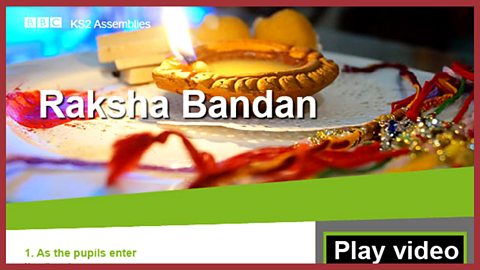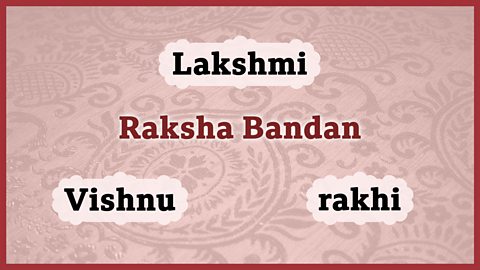In short...
Themes: Hinduism; celebrating world religions; celebrating our brothers and sisters; Raksha Bandan and making promises.
Summary: The annual festival of Raksha Bandan celebrates the love between brothers and sisters. The word βrakshaβ means βprotection' and βbandanβ means βtie.β Traditionally βRakhisβ were made of thin cotton but today they can be very elaborate and colourful.
Resources: the display (see Key links).

The video
Two children - Vraj and Simran - explain the festival and how they celebrate it. Simran goes shopping to buy a 'rakhi' for Vraj and he dresses up for the celebration.
An ancient story from Hindu scripture is remembered during the festival. When Vishnu goes to live with King Bali his wife, Lakshmi, is so sad that she visits King Bali and ties rakhi to him. When the king asks what she wants in return Lakshmi asks for her husband back.
During this festival, sisters tie rakhi on their brothersβ arms and brothers promise protection and give gifts to their sisters.
Duration: 3' 45"
End of speech: 'β¦He'd hopefully be there, at the right time.'
Video questions
- What is a 'rakhi'? (Traditionally it was a strip of colourful cotton to be tied around the wristβ¦but, as the video makes clear, rakhis have developed over timeβ¦)
- What is the difference between rakhis in the past and today? (They used to be made from cotton but today they can be far more intricate and elaborate.)
- Who does the god Vishnu go to live with? (King Bali.)
- What does Simran pray for when she ties the rakhi on Vraj? (A happy and healthy life in the year ahead.)
- Why does Vraj touch Simranβs feet? (He is younger than her and touches her feet to show respect.)
- If you do not have a brother who can you give a rakhi to? (Your cousin or friends.)

Key links
Download / print the assembly framework ready for use

Display the image showing the keywords.


Suggested framework
1. Entry music As the pupils enter you could play a song about siblings to sow seeds in the children's minds - eg 'We are familyβ (Sister Sledge) or 'He ain't heavy, he's my brother' (The Hollies). Display the image (see 'Key links') and define the words on it either before or after the video (βRaksha Bandan,β βVishnu,β βLakshmiβ and βrakhiβ).
2. Introduction Begin by asking the children about their brothers and sisters and gathering the answers. For example: 1. Who here has a brother or a sister - perhaps one who is with us today? 2. When might we celebrate having a brother or sisterβ¦and how? (Birthdays; Christmas; by giving presents; other occasionsβ¦) 3. Is it always easy having a brother or sister - are there ever squabbles? Go on to explain that the children are going to watch a short video about a Hindu festival that celebrates brothers and sisters (and refer to the words / names on the image if you wish to).
3. The video Play the video. The duration is 3' 45" and the final words are: 'β¦He'd hopefully be there, at the right time.' You can opt to share the 'Video questions' before watching the video if you wish.
4. After the video Share the 'Video questions' to consolidate recall of the information. 1. What is a rakhi? 2. How have rakhis changed over time? 3. Who does the god Vishnu go to live with? 4. What does Simran pray for as she ties the rakhi? 5. Why does Vraj touch Simran's feet? 6. Who can you give a rakhi to if you do not have a brother / sister?
5. Time to talk Ask children to tell the person next to them who they would want to tie a rakhi on / give a present to? If you could choose anybody in the world to give rakhi to / receive rakhi from, who would it be and why? Do we ever make promises that we cannot keep? Do we choose who we are 'there for'? Is this always planned or can we be there for somebody spontaneously?
6. Opportunity to sing An opportunity to sing your chosen song. Suggestions from ΒιΆΉΤΌΕΔ collections below.
7. Opportunity to reflect βIβll be there for youβ could be the focus of the reflection in this assembly. 'Sometimes we say to others - or they say to us - 'I'll be there for you'β¦meaning 'I'll support you'β¦or 'I'll look after you.' Who is always there for youβ¦? How do you know that somebody is there for youβ¦? How do people behave if they are there for youβ¦? What do they do to show youβ¦? How do they speak to you, what do they sayβ¦? Would anybody say that you are always there for themβ¦? Is there someone who needs you to be there for them todayβ¦?'
8. Opportunity for prayer Use your standard form of address (Dear God, etc) and: βThank you for our brother and sisters and families. Thank you that you are always there for me. Help me to remember that at my toughest times, you are actually nearest to meβ¦walking by my side. Amen.β

Suggested songs
All together as a family - Vocal
Some can dance and some can sing,
Some can fiddle on a violin.
Some can bat and some can bowl,
Some can tackle and score a goal.
Some can paint and some can sew,
Some can juggle and some can throw.
Some can throw, some can throw.
All that we can do or be
All together as a family.
All together as a family.
All together as a family.
All together as a family.
Some can run and some can swim,
Some do somersaults in the gym.
Some can ride or climb a tree,
Some are good at technology.
Some can teach and some can guide,
Some get everybody organised.
Organised, organised.
All that we can do or be
All together as a family.
All together as a family.
One for all and all for one,
All together we get things done.
We get things done.
All that we can do or beβ¦
[spoken] 1, 2, 3, 4, 5, 6, 7, 8
All together as a family.
All together as a family (backing track)
Some can dance and some can sing,
Some can fiddle on a violin.
Some can bat and some can bowl,
Some can tackle and score a goal.
Some can paint and some can sew,
Some can juggle and some can throw.
Some can throw, some can throw.
All that we can do or be
All together as a family.
All together as a family.
All together as a family.
All together as a family.
Some can run and some can swim,
Some do somersaults in the gym.
Some can ride or climb a tree,
Some are good at technology.
Some can teach and some can guide,
Some get everybody organised.
Organised, organised.
All that we can do or be
All together as a family.
All together as a family.
One for all and all for one,
All together we get things done.
We get things done.
All that we can do or beβ¦
[spoken] 1, 2, 3, 4, 5, 6, 7, 8
All together as a family.
Build up - Vocal
Verse 1:
Every word you say, (wo-oh)
Every game you play, (wo-oh)
Every silly face, (wo-oh)
Every single place, (wo-oh)
You can build up,
[spoken] 1, 2, 3, 4, 5!
Or you can tear down.
Chorus:
Build up one another,
Build up your sisters and brothers,
Build up one another,
Build up!
Verse 2:
Every joke you tell, (wo-oh)
Every name you spell, (wo-oh)
Everywhere you go, (wo-oh)
Everyone you know, (wo-oh)
You can build up,
[spoken] 1, 2, 3, 4, 5!
Or you can tear down.
Chorus:
Build up one another,
Build up your sisters and brothers,
Build up one another,
Build up!
Build up!
Build up!
Build up - Backing
Verse 1:
Every word you say, (wo-oh)
Every game you play, (wo-oh)
Every silly face, (wo-oh)
Every single place, (wo-oh)
You can build up,
[spoken] 1, 2, 3, 4, 5!
Or you can tear down.
Chorus:
Build up one another,
Build up your sisters and brothers,
Build up one another,
Build up!
Verse 2:
Every joke you tell, (wo-oh)
Every name you spell, (wo-oh)
Everywhere you go, (wo-oh)
Everyone you know, (wo-oh)
You can build up,
[spoken] 1, 2, 3, 4, 5!
Or you can tear down.
Chorus:
Build up one another,
Build up your sisters and brothers,
Build up one another,
Build up!
Build up!
Build up!

